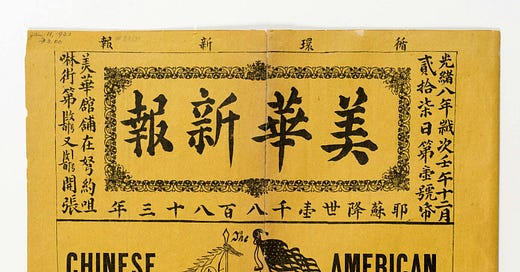963 is the number of miles from 赣州, China to 青岛, China. The former is where my parents are from; the latter, Wong Chin Foo. While our hometowns might be on the opposite ends of the country that has withered through the Opium Wars, Taiping Rebellion, and more, that Chinese spirit in both of us — writing — is only 1 centimeter away.
I write. I’m part of my school’s journalism club but nothing to the extent of Mr. Wong’s newspaper: The Chinese American, which herded all the Chinese in one direction by two things — hope and unity. His last sentence of an article would be “Your humble brother, Wong Chin Foo.” Because he was a brother within a family of the numerous Chinese immigrants living across the United States. All families are united. So was Mr. Wong’s Chinese American nest, especially when the American government, according to Mr. Wong, turned a deaf ear when Zhenjin, a Chinese American lady from San Francisco, was shot by a man: “Now that she is dying, she wants justice to be done. We have not yet heard from the American government about sentencing by far.” (Wong 1883, 4).
And unity wasn’t an easy thing to synthesize. Even within Jiangxi (where my DNA calls home sweet home), culture changes from town to town; language changes from village to village. I personally hate people from 南昌, the capital of Jiangxi. They murder all the news attention that 赣州 won. So, yes, I’m honestly shocked how Wong managed to coalesce close-minded Chinese individuals — from different provinces, villages, and towns — into one whole group and advocate on their, and my, behalf. Most, like myself, would only care about my town and my food and my culture and my dialect.
Mr. Wong, with English being his second language, probably never learned the word “my.” But he certainly did learn “our.”





Yay!!!!!! This just gets more and more interesting. I love it! Well done 🥳